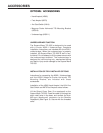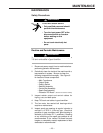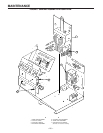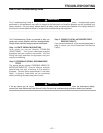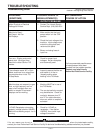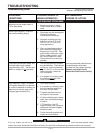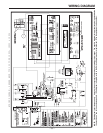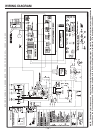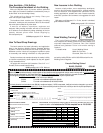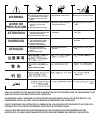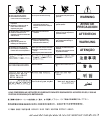
– 32 –
TROUBLESHOOTING
Troubleshooting Guide
Observe Safety Guidelines
detailed in the beginning of this manual.
PROBLEMS
(SYMPTOMS)
Machine has low output when in
TIG 4-Step Mode.
Weak high frequency - machine
has normal welding output.
The display shows zero amps, but
indicates open circuit voltage
(approximately 53V). The arc start
switch or amptrol is not
actuated.
High frequency “Spark” is present
at tungsten electrode, but operator
is unable to establish a welding arc.
Machine has normal open circuit
voltage (approximately 53V).
POSSIBLE AREAS OF
MISADJUSTMENT(S)
1. Machine must be in “Local”
Control Mode when 4-Step is
used.
1. Spark gap may be misadjusted.
Check and reset per
maintenance instructions.
2. Improper shielding gas flow.
Adjust for a flow of 10 to 30
CFH (4.7 to 14.1 l/min.) for
most applications.
3. Work and electrode cables in
poor condition allowing high
frequency to “Leak Off”. Use
good quality cables with a high
natural rubber content, such
as Lincoln Stable Arc Cable.
Cables should be as short as
possible.
1. The arc start switch or amptrol
may be defective. There should
not be any continuity between
pins “D” and “E” on the arc start
cable connector, unless the
unit is actuated.
2. If an amptrol is not being used,
the machine must be in the
Local Control Mode.
1. Torch may be faulty.
2. If an amptrol is not being used,
then the machine must be in
the Local Control Mode.
3. Tungsten electrode may be
too large for the process.
4. If helium shielding gas is being
used, then reduce percentage
of helium.
5. If TIG welding in the DC
negative
mode, then a properly
sharpened thoriated tungsten
should be used.
6. Check the welding cables and
output stud connections.
RECOMMENDED
COURSE OF ACTION
If all recommended possible areas
of misadjustment have been
checked and the problem persists,
Contact your local Lincoln
Authorized Field Service Facility.
TIG WELDING PROBLEMS
If for any reason you do not understand the test procedures or are unable to perform the tests/repairs safely,
contact your local Authorized Field Service Facility for technical troubleshooting assistance before you proceed.
CAUTION



